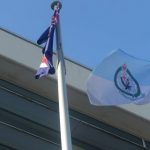New Police Watchdog Lacks the Funding to Investigate Complaints

The new NSW police watchdog has revealed that due to a lack of funding it’s had to forego monitoring a large number of already active critical incident investigations, as well as disregard more than fifty police integrity complaints.
In a submission to a joint parliamentary committee on oversight published on March 12, the Law Enforcement Conduct Commission’s (LECC) assessment of its own operations outlines that while much has been achieved, other matters that “warranted investigation” have not been dealt with.
In a letter to the committee, LECC chief commissioner Michael Adams stressed that with “continued increasing workload and reduced resourcing” the commission is undergoing difficulties “in continuing to exercise its functions to the standard I… would insist on for such an important agency.”
A single oversight body
The LECC was designed to replace and streamline the functions of the Police Integrity Commission, the police division of the NSW Ombudsman and the inspector of the NSW Crime Commission (NSWCC). It began its operations on July 1 last year.
Under the Law Enforcement Conduct Commission Act 2016, the LECC has a far broader statutory role that its predecessors, but its funding doesn’t reflect this. The 2015 Tink Report recommended the body be established, and it also stated that short-term cost-savings shouldn’t be a priority.
The NSW Council for Civil Liberties described the LECC as being of “vital importance” in February last year. The council said the body “will significantly improve some aspects of police oversight and accountability.” But, it questioned leaving critical incident investigations in the hands of NSW police.
Past incidents ignored
Under its increased mandate, the LECC is required to monitor police critical incident investigations, which occur when an individual dies or suffers a serious injury as a result of interacting with police.
In a statement issued to Sydney Criminal Lawyers® an LECC spokesperson made clear that of the 26 critical incidents that occurred over its first seven months of operations, all have been actively monitored by the watchdog.
However, as of July 1 last year, there were already 81 critical incident investigations underway, which don’t fall into the LECC’s remit.
“The LECC assessed 29 of these to be high-risk according to a number of criteria, including the nature of the incident and the vulnerability of persons involved, and has chosen to monitor these investigations,” the LECC spokesperson explained.
Back into police hands
The LECC integrity division is charged with detecting, investigating and exposing serious misconduct within the NSW police force and the NSWCC. Over its first seven months of operations, the LECC has commenced 93 investigations.
But, a further 51 police integrity complaints “that warranted investigation by the LECC” were instead given to NSW police to investigate. These complaints couldn’t be addressed by the oversight body due to “insufficient staffing resources.”
“These matters were not direct complaints by the public to the LECC, but were picked up through the LECC’s monitoring of the NSW police force’s complaints management database,” the spokesperson said.
“Upon assessing these matters and consideration of other priorities, the LECC referred these matters back to the NSW police force for investigation with independent oversight by the LECC,” she continued.
The police blacklist
The LECC spokesperson pointed out that the oversight body currently has a focus “on a range of projects to identify and analyse systemic issues in collaboration with the NSW police force.” And one of these is how the Suspect Target Management Plan (STMP) is applied to young people.
The inquiry into this program was sparked by the release in October last year of the Youth Justice Coalition Policing Young People in NSW report. The study raised concerns over NSW police monitoring of children and young people placed on the STMP.
The STMP allows police officers to place recidivist offenders, along with individuals who’ve never been convicted of a crime, but are merely suspected of being at risk of committing future crimes, on a secretive list for targeted intensive policing.
STMP targets are then repeatedly stopped and searched by police, as well as being subjected to regular home visits from officers, regardless of which offence, if any, they’ve previously committed.
The LECC submission reports that five investigations are underway into “complaints and misconduct information, where a young person, who was subjected to the STMP, was also allegedly subject to unlawful police conduct.”
Inadequate policing
Another LECC focus area is the policing of domestic and family violence incidents. The oversight body is concerned over a four-fold increase in complaints in this area since July last year. Two thirds of these were made directly to NSW police and the remainder were made to the commission.
The submission outlines that 66 percent of these complaints were made by the general public. The most common allegations were failing to apply for apprehended violence orders and not recording domestic and family violence incidents.
Complaints have also been made about the attitude and behaviour of police officers recording the details of incidents and interviewing the victims. And the data reveals that a higher number of domestic and family violence incidents doesn’t necessarily result in an increased level of complaints.
Systemic sexism
The LECC is also currently investigating allegations of sexual discrimination, harassment and bullying made by several police officers against a senior NSW police officer. Initial analysis has identified systematic bullying, and the use of sexually derogatory terms at the local area command.
Similar issues arose a decade ago, which led to an independent inquiry into sexual misconduct allegations at Goulburn Police Academy. The LECC states that it’s important to explore whether the current allegations are isolated incidents or if they occur more broadly across the police force.
A narrowing reach
Mr Adams wrote in his letter that he was pleased that over its first seven months of operations, the LECC has assessed 1,975 complaints, attended the scene of 16 critical incidents, and seen 259 charges laid in relation to three investigations.
However, the former NSW Supreme Court justice warned that “given the budgetary issues” the police oversight body is now facing, he expects that the pressure the LECC is currently under “will continue to escalate in future years.








